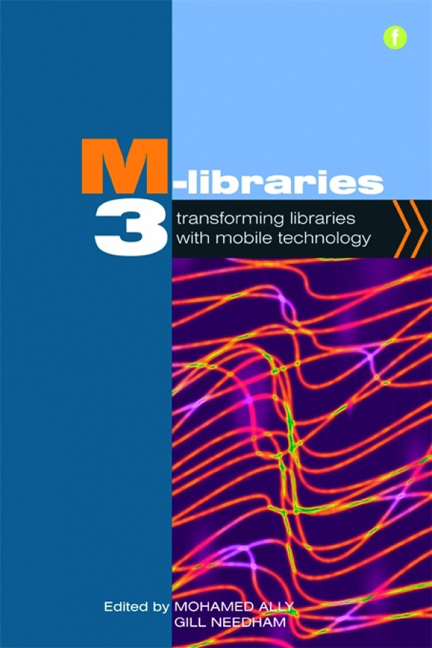Book contents
- Frontmatter
- Contents
- Acknowledgements
- Contributors
- Foreword
- Introduction
- 1 Education for all with mobile technology: the role of libraries
- PART 1 DEVELOPING MOBILE SERVICES
- PART 2 PEOPLE AND SKILLS
- PART 3 FOCUS ON TECHNOLOGY
- 15 Mobile services of the National Library of China
- 16 India's mobile technology infrastructure to support m-services for education and libraries
- 17 Use and user context of mobile computing: a rapid ethnographic study
- 18 Meeting the needs of library users on the mobile web
- 19 Mobile dynamic display systems for library opening hours
- 20 Device-independent and user-tailored delivery of mobile library service content
- 21 Designing effective mobile web presence
- Conclusion
- Index
15 - Mobile services of the National Library of China
from PART 3 - FOCUS ON TECHNOLOGY
Published online by Cambridge University Press: 08 June 2018
- Frontmatter
- Contents
- Acknowledgements
- Contributors
- Foreword
- Introduction
- 1 Education for all with mobile technology: the role of libraries
- PART 1 DEVELOPING MOBILE SERVICES
- PART 2 PEOPLE AND SKILLS
- PART 3 FOCUS ON TECHNOLOGY
- 15 Mobile services of the National Library of China
- 16 India's mobile technology infrastructure to support m-services for education and libraries
- 17 Use and user context of mobile computing: a rapid ethnographic study
- 18 Meeting the needs of library users on the mobile web
- 19 Mobile dynamic display systems for library opening hours
- 20 Device-independent and user-tailored delivery of mobile library service content
- 21 Designing effective mobile web presence
- Conclusion
- Index
Summary
Introduction
This chapter focuses on the history of ‘NLC IN Your Palm’ and introduces the following public services: SMS, Wireless Application Protocol (WAP) and mobile phone offline applications. With 3G communications technology, the National Library of China (NLC) will further strengthen its research and development of mobile terminal services and resources. NLC will also strengthen the development of mobile reading using hand-held mobile reading devices. This chapter also analyses the challenges for mobile library services, including multiplatform terminals, the organization of resources, user experience and copyright protection in the mobile internet environment.
Mobile services of China's public libraries
With the development of mobile technology, promotion of mobile applications, gradual popularization of 3G and emergence of 4G, the numbers of mobile phone and smartphone users are gradually growing. As was revealed by the Ministry of Industry and Information Technology of the People's Republic of China (PRC) in the 2010 Statistical Bulletin of the National Telecom Industry, the number of mobile users had reached 859 million as of 2010, including 47.05 million 3G users. The number of mobile phone netizens reached 303 million, accounting for 66.2% of the total number of internet users. Thus, more and more users are accessing information from the internet via mobile phones and other mobile devices. The survey showed that, with the opening and popular - ization of 3G services offered by various operators, 46.5% of mobile phone netizens would be accessing the internet by 3G mobile phone in the following six months. In the era of the mobile internet, information access modes are developing towards personalization, targeting inform - ation and so on. The mobile internet will become the most important supplementary internet tool for information access and communication. The development of mobile communication technology is driving libraries’ mobile services. Domestic mobile library services have been increasing gradually since 2000 and entered a concentrated stage of development from 2005. Before 2007, the services were mainly based on SMS. After 2007, with the development of wireless network technology, WAP services gradually emerged, forming a complementary pattern with SMS services. In 2010, some libraries started to try out mobile phone app store services.
NLC prepared to launch mobile services in 2006. Following the pattern of mobile communications and consumer behaviours, it launched the NLC SMS platform in 2007, providing readers with basic services and information through SMS.
- Type
- Chapter
- Information
- M-Libraries 3Transforming libraries with mobile technology, pp. 129 - 138Publisher: FacetPrint publication year: 2012

